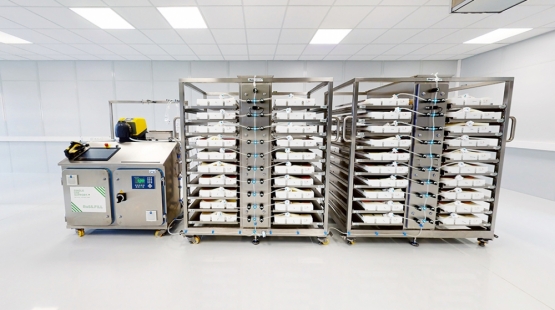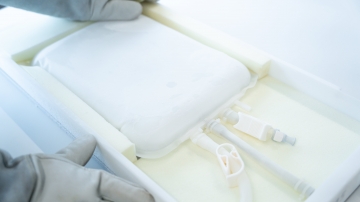Antibody storage: preserving monoclonal antibodies
Table of contents
ShowAntibody storage stands as a linchpin in safeguarding their quality: It is to ensure the cold chain across scientific research and diagnostics as well as the efficacy and safety of their clinical applications.
The integrity of these essential proteins hinges on optimized storage conditions, dictating their shelf-life and sustained antibody stability. Maintaining optimal storage conditions throughout the monoclonal antibody manufacturing process isn't merely a procedural detail – it profoundly impacts the reliability and reproducibility of experimental results.
In this article, we will discuss the main aspects of antibody storage, along with means and methods to optimize it.
Why to bother with monoclonal antibody storage
Monoclonal antibodies are being increasingly used across life sciences – be it in scientific assays, in vivo studies, drug manufacturing or clinical applications. It is therefore vital for manufacturers to make sure they produce top-notch mAbs that are safe and reliable.
This also implies the necessity to optimize mAb storage: Nevertheless, not only maintaining the potency and efficacy of mAbs are tied to their storage conditions, influencing their shelf-life and overall stability – as shall be illustrated below:
- Potency and efficacy: The potency of mAbs, crucial for accurate experimental outcomes in assays and in vivo studies, is directly linked to their freezing performance and storage conditions. Fluctuations in storage environments can compromise the potency and effectiveness of these antibodies.
- Preservation of antibody characteristics: Maintenance of primary antibody characteristics (of mAbs like IgGs, but also of recombinant or polyclonal antibodies) is paramount for reliable experimental results in techniques like Western blotting, where specific and consistent antibody binding is crucial.1
- Influence on protein concentration: Storage conditions profoundly impact protein concentration, which might alter at too high temperatures.
Source: National Center for Biotechnology Information1
How antibodies are stored
Antibody storage is a major challenge in monoclonal antibody manufacturing: Practices encompass critical distinctions between long-term and short-term preservation methods, both pivotal in safeguarding their efficacy. Long-term storage at subzero temperatures necessitates elaborate strategies, often involving the integration of cryoprotectants like glycerol and stringent temperature controls. On the other hand, short-term storage at temperatures higher than 0 °C demands immediate access protocols and controlled environmental conditions to prevent degradation.
The process involves more than just containment. Dilution-free storage is paramount to maintain the concentration and potency of antibodies. Proper storage of vials or bioprocess containers, selected according to specific guidelines and catering to precise storage conditions, significantly influence antibody stability and longevity.
Minimizing freeze-thaw cycles is a universal mandate, as frequent temperature shifts can compromise antibody structure and function. Adhering to recommended storage practices mitigates the risk of degradation, preserving the antibodies' integrity.
But this is far from being all: In the following chapter, we will illustrate some further requirements in mAb storage – from temperature ranges to the use of cryoprotective agents (CPAs).
Long-term storage vs. short-term storage of mAbs
In storing monoclonal antibodies (mAbs), the distinction between long-term and short-term approaches brings numerous implications. Long-term storage at subzero temperatures aims for stability over extended periods, often over several years. Cryoprotectants like glycerol, while not always mandatory, can safeguard against freeze-thaw damage. Precise temperature control and techniques such as centrifugation, dialysis, and purification play essential roles.
Short-term storage involves the cooling of antibodies at temperatures around 4 °C, possible for time spans between a few days to several weeks (also depending on the specific product). This storage form is designed for immediate use, focuses on controlled conditions without heavy reliance on cryoprotectants. However, maintaining the optimal protein concentration through proper handling remains crucial to uphold efficacy during shorter storage periods.2
What temperature are antibodies stored at?
The optimal storage temperature significantly influences antibody stability and functionality. Long-term storage recommendations often refer to temperatures as low as -80°C, ensuring sustained antibody integrity.3
On the other hand, temperature fluctuations pose severe risks of antibody degradation. For shorter-term storage, maintaining temperatures slightly above freezing (at 4°C) in controlled refrigeration is preferable, balancing stability without subjecting antibodies to extreme freezing conditions.4
Cryoprotectants like glycerol may be used in long-term storage, safeguarding antibodies at freezing temperatures by shielding them from structural damage. These protective agents can ensure antibody potency, resilience against freezing point-related challenges, and stability during storage.3 4
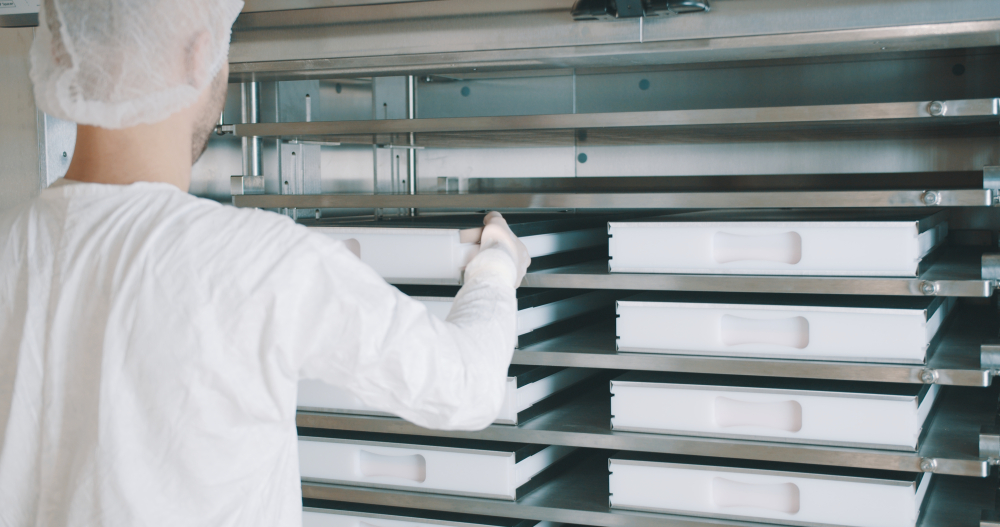
Dilution(-free)?
Dilution can significantly impact the stability and the final concentration, potentially affecting the antibodies' efficacy in various applications. Thus, maintaining the original antibody concentration without dilution is crucial to preserve their qualities.5
Aliquotation of highly concentrated antibody solutions into smaller volumes proves to be a better option than creating antibody solutions in low concentrations: It equally minimizes the need for repeated thawing of the entire stock, thereby reducing the risk of degradation and maintaining the integrity of the antibodies.6
Appropriate storage containers consequently hold significance as well. They allow safe handling of monoclonal antibodies when choosing the optimal size and high-quality materials.5 6
Avoiding contamination
Preserving antibody integrity during storage requires distinct measures to avoid contamination. Antimicrobial agents like sodium azide and thimerosal may act as preservatives, deterring bacterial growth and maintaining optimal storage conditions. However, the reagent sodium azide is not suitable for every later application of mAbs due to its toxicity by blocking the cytochrome electron transport system in many organisms.7
Another problem with sodium azide arises when enzyme-conjugated antibodies (e.g. HRP-conjugated antibodies, no matter if primary antibodies or secondary antibodies are used) are to be generated. Sodium azide will disturb conjugation related to the amine group, and must therefore be removed when previously used to store antibodies.7
Establishing and maintaining a sterile environment alongside the use of antimicrobial measures significantly contribute to preserving antibody purity. It is therefore also essential to design fail-safe processes and use equipment that allows reliable aseptic filling.7
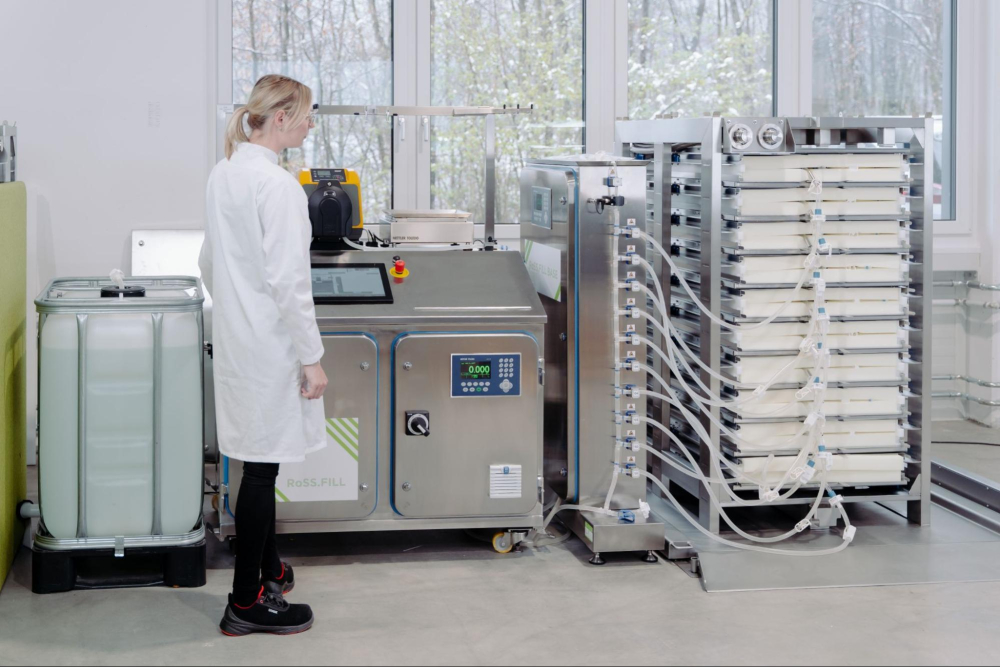
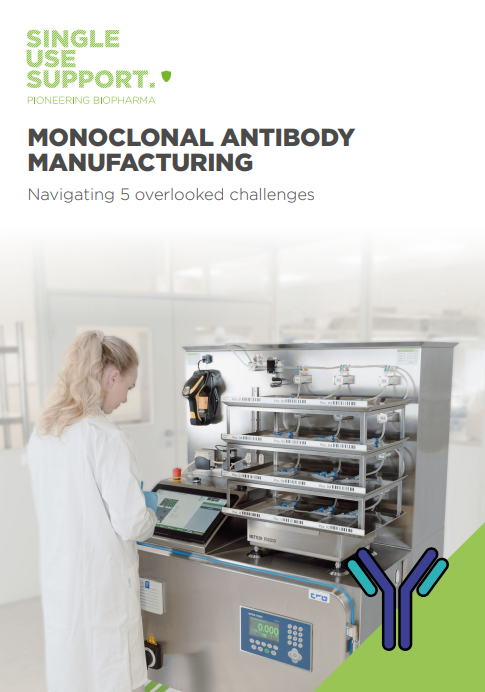
Download Guide
Navigating 5 Overlooked Challenges in Monoclonal Antibody Manufacturing
Automated fluid management in antibody manufacturing
Automated fluid management is being increasingly relied on in the manufacturing process of antibodies. These systems offer precise control over the handling of critical fluids, enhancing efficiency and maintaining product quality – not only of purified antibodies after being subjected to procedures like centrifugation and gel filtration, but also of ascites fluids and other intermediates.
Single Use Support’s answer to the need for automated, aseptic fluid management is the RoSS.FILL system. This cutting-edge technology represents a transformative approach to fluid handling in antibody manufacturing. It offers a fully automated, scalable platform for aseptic filling and filtration processes. Its adaptability spans various batch sizes, accommodating seamless transitions between laboratory-scale experiments and large-scale production. At the same time, it carries a decreased risk of contamination and human error.
Plate-freezing platform for mAbs
Plate-freezing platforms offer numerous advantages in preserving antibody stability and maintaining optimal binding capacity. These platforms ensure controlled cooling and thawing rates, critical factors in safeguarding the structural integrity and functionality of antibodies.
The controlled cooling process prevents ice crystal formation, minimizing potential damage to the delicate structures. Moreover, the ability to accommodate both low and high-speed freezing rates are beneficial, allowing tailored approaches for diverse antibody formulations.
Single Use Support’s RoSS.pFTU platform offers a compatible and reliable solution for preserving antibody stability and binding capacity via plate freezing, allowing for controlled and consistent freezing and thawing of antibodies. The platform's adaptability and precision align seamlessly with the demands for preserving monoclonal antibodies in different volumes and according to stringent industry standards.
Ultra-cold storage of monoclonal antibodies
Following a controlled freezing process, it is necessary to provide a stable temperature environment for monoclonal antibodies in order to maintain their integrity. To this aim, the dedicated ultra-low temperature storage freezer RoSS.ULTF can be implemented into delicate cold chains: It allows the space-efficient storage of monoclonal antibodies at temperatures as low as -75 °C.
Precise temperature monitoring, high consistency, and scalability make sure that RoSS.ULTF is ready for current as well as future requirements in mAb storage, and builds a bridge between antibody freezing and thawing.
Single Use Support – your partner in antibody fluid and cold chain management
At Single Use Support, we help manufacturers in optimizing antibody storage through cutting-edge single-use solutions. With advanced cold chain management platforms that are scalable and adaptable, we provide biopharma companies with the necessary tools to cope with the temperature sensitivity of mAbs.
Additionally, our RoSS.FILL system stands out as an automated fluid management solution for antibody manufacturing. This platform, along with our single-use bioprocess containers, offers sterile and reliable storage solutions throughout the biomanufacturing process while being able to manage protein solutions of high viscosity.
Through innovative technology, Single Use Support caters to the stringent requirements of antibody storage, enhancing efficiency and reliability in biopharmaceutical operations.
- The necessity of and strategies for improving confidence in the accuracy of western blots, http://dx.doi.org/10.1586/14789450.2014.939635, Published 2014-07-25
- Antibody Shelf Life/How to Store Antibodies, http://dx.doi.org/10.13070/mm.en.2.120, Published 2013-10-31
- Cold denaturation of monoclonal antibodies, http://dx.doi.org/10.4161/mabs.2.1.10787, Published 2010-05-03
- Treat Them Right! – Best Practices for Storing and Working with Antibodies, https://www.bio-rad-antibodies.com/blog/antibody-best-practices.html, Published
- Antibody Shelf Life/How to Store Antibodies, http://dx.doi.org/10.13070/mm.en.2.120, Published 2013-10-31
- Antibody storage guide , https://www.abcam.com/ps/pdf/protocols/antibody_storage.pdf, Published
- Antibody Storage and Handling – GaoLab, https://drexel.edu/~/media/Files/medicine/drexel-pdfs/labs/gao/Drexel_Gao_Lab_Antibody_Storage_and_Handling.ashx?la=en, Published


